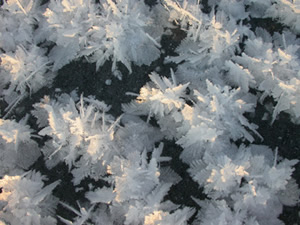The rigors of research in the cold
The rigors of research in the cold
Submitted by Ned Rozell
Phone: 907-474-7468
01/09/09

Rod Boertje knew it was getting cold when the National Park Service took the dogs inside. Boertje, then a graduate student in wildlife biology at the University of Alaska, was doing a study on caribou in Denali National Park in the early 1980s. Park rangers, saying it was too cold for the sled dogs that had brought Boertje to his study area, mushed the dogs back to a warm kennel. Boertje stayed behind, watching caribou to see what they did in the winter. He’s one of a few scientists who have done field work in Alaska on the coldest days of winter.
Boertje, now a biologist for the Alaska Department of Fish and Game, brought three thermometers with him on his graduate study. He confirmed minus 60 degrees Fahrenheit, while he and another student watched caribou in a valley below.
"It was real marginal," he said. "You put on all the gear you had to sleep, then got into your 40-below bag. There was still no way to keep warm unless you were moving."
Boertje says he would never work at those temperatures today, and not just because he’s no longer a graduate student.
"Airplanes don’t work that well and helicopter pilots won’t fly in this at all," he said of temperatures at 40 degrees below zero and the ice fog that comes with them.
And the caribou? Boertje said the animals didn’t seem to mind the cold temperatures.
"They had a very similar pattern to summer time. They’d lay down, then get up to graze for about an hour just like they would if it was warm."
Craig Gardner, another biologist for ADFG, followed wolverines around the Alaska Range for his master’s degree. The temperatures in the Susitna River basin that December ranged from 40 to 55 degrees below zero. He remembers firing up the Mountain Safety Research stove in the tent to stay warm during the 15 hours he spent in the tent each day because of darkness.
"It was kind of fun, but I was younger then," Gardner said.
He and a partner tracked wolverines during the light of the day, finding that the animals moved a lot without covering much distance, sometimes hunkering in snow caves. Gardner didn’t lose any body parts during the study, but said he wouldn’t want to repeat the experience.
"I wasn’t too sad when we got plucked out of there."
As someone who studies snow, Matthew Sturm has spent up to 40 days in the field during the winter. Much of his research is on Alaska’s North Slope, known to be a windy, dark, cold place. Sturm, who works for the Army’s Cold Regions Research and Engineering Laboratory at Fort Wainwright, traverses the North Slope on snowmachine and tracked vehicle, taking thousands of snow-depth and other measurements. His trips have taken him from the Brooks Range to the Arctic Ocean and on to Hudson Bay as he gathers data that help scientists quantify the blanket of snow that both insulates the Arctic and reflects sunlight.
Though he usually traverses the landscape in March, temperatures can still drop to minus 40 degrees Fahrenheit. Sturm and his colleagues usually stay in an Arctic Oven tent, but the tent doesn’t help when it’s time to take measurements.
"We have a lot of sophisticated equipment that gets trashed in the cold," he said. "And something that would take two minutes to fix on a normal day takes hours to fix in the cold."
When the frigid air hits, such as that registering on thermometers around Alaska in the first weeks of 2009, most scientists opt to stay inside and make sense of data gathered in their studies, a task well suited for Alaska winters. On a day not long ago, when it was minus 40 degrees, Sturm was doing work that didn’t require bunny boots.
"We’re hunkered in front of a computer," he said. "There’s no heroics today."
This column is provided as a public service by the Geophysical Institute, University of Alaska Fairbanks, in cooperation with the UAF research community. Ned Rozell is a science writer at the institute.


